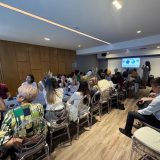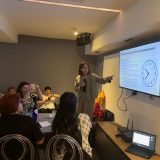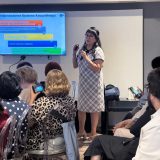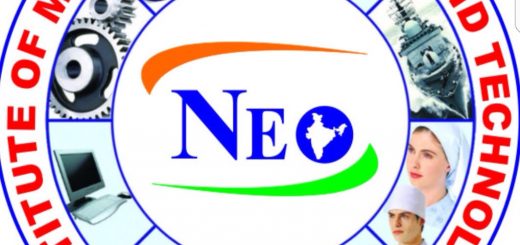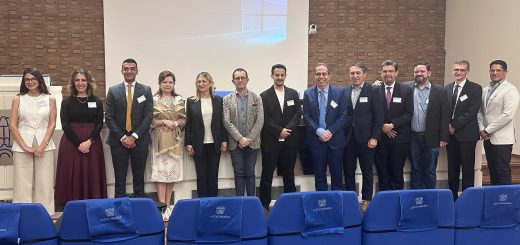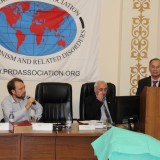Support for Families and Development of the Dementia Alliance
The Department of Neurology continues its series of educational events for practical healthcare, dedicated to the 95th anniversary of S.D. Asfendiyarov KazNMU and the 90th commemoration of Professor S.K. Kaishibaev, within the framework of implementing the cascade training method for practical healthcare specialists in line with the Roadmap for Improving Neurological Medical Care for the Adult Population of the Ministry of Health of the Republic of Kazakhstan for 2025–2027, No. 03324 dated January 23, 2025.
Faculty members of S.D. Asfendiyarov KazNMU conducted a cycle of summer educational lectures for primary healthcare physicians within the framework of the project “Alzheimer’s Disease School.” The meetings, held on July 10, July 22, and August 22, brought together dozens of specialists from across the region.
The goal of the project is to improve physicians’ competencies and disseminate up-to-date knowledge on the diagnosis, treatment, and prevention of Alzheimer’s disease, one of the most urgent medical and social issues of the 21st century.
The keynote speech was delivered by Prof. Turuspekova S.T., Chief Freelance Neurologist of the Ministry of Health of the Republic of Kazakhstan and Head of the Department of Neurology at S.D. Asfendiyarov KazNMU. In her comprehensive presentation, she shared the latest data on the global and national prevalence of Alzheimer’s disease, current insights into causes and risk factors, and highlighted innovative approaches to early diagnosis and therapy. Her talk resonated strongly with the audience, emphasizing the importance of an interdisciplinary approach and timely identification of cognitive impairments.
Modern Diagnostics and Clinical Aspects
An insightful, practice-oriented presentation was delivered by Dr. Tsoi R.T., neurologist, PhD, Assistant Professor of the Department of Neurology at S.D. Asfendiyarov KazNMU. She presented an overview of current methods of instrumental and neuropsychological diagnostics of cognitive disorders, detailed international assessment scales, and demonstrated a clinical case from practice. The audience emphasized the practical value of the material and noted that these approaches could be directly integrated into routine patient care.
Support for Families and Development of the Dementia Alliance
A special interest was generated by the presentation of Mamashev N.K., Assistant at the Department of Neurology at S.D. Asfendiyarov KazNMU. The speaker highlighted the importance of psychological and social support for patients’ families and shared information on the establishment of the Kazakhstan Alzheimer’s and Dementia Alliance. It was noted that Kazakhstan’s integration into the international community enables the exchange of best practices and improvement of care for patients and their families.
Project Significance and Outcomes
All three events attracted great interest among primary healthcare physicians. The discussed topics, practical examples, and up-to-date scientific data became a valuable tool for enhancing specialists’ skills.
Thanks to the “Alzheimer’s Disease School,” doctors gained:
- knowledge of modern methods for diagnosing and treating dementia;
- access to international clinical scales and protocols;
- understanding of the importance of a multidisciplinary approach and family support;
- the opportunity to become part of a professional community working to improve patients’ quality of life.
“Raising awareness among primary healthcare doctors is a key step toward early diagnosis of Alzheimer’s disease and timely intervention. Such educational initiatives help implement modern approaches and increase the accessibility of high-quality care,” emphasized Prof. Turuspekova S.T., Head of the Department of Neurology at S.D. Asfendiyarov KazNMU, Chief Neurologist of the Ministry of Health of the Republic of Kazakhstan.
About the Project “Alzheimer’s Disease School”
The project is implemented by the Department of Neurology of S.D. Asfendiyarov KazNMU within the framework of the national initiative to improve physicians’ competencies in diagnosing and treating dementia. Future plans include expanding the format of training sessions, integrating digital tools, and collaborating with international experts to enhance neurological care in Kazakhstan.
The events were held with the informational support of Egis.



